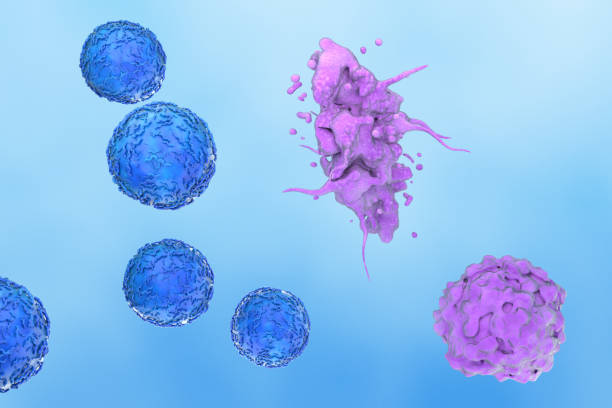Get Easy Health Digest™ in your inbox and don’t miss a thing when you subscribe today. Plus, get the free bonus report, Mother Nature’s Tips, Tricks and Remedies for Cholesterol, Blood Pressure & Blood Sugar as my way of saying welcome to the community!
Molecule ‘switch’ programs cancer cells to self-destruct

As long as research into treating cancer has been going on, there are still just three main therapies oncologists rely on…
Surgery, chemotherapy and radiotherapy (radiation therapy). Though these treatments, or a combination of them, may work at first, treatment-resistant cancers often return. And chemotherapy, a mixture of toxic drugs, can have detrimental effects on the body, particularly the heart.
According to cardiologist, Dr. Elizabeth Klodas, heart disease remains the number one killer of women, including those diagnosed with breast cancer.
She writes in her blog that “Many treatments designed to target breast cancer can also have toxic effects on the heart, and/or damage the heart muscle and blood vessels.”
That’s why breast cancer patients may develop cancer treatment-related cardiac dysfunction (CTRCD) which may lead to heart failure. They may also develop high blood pressure, arrhythmia and progressive coronary artery disease.
Immunotherapy, the newest kid on the block, was considered quite promising at breaking the cycle of cancer returning. But we’ve learned that it only helps a small number of patients, particularly those with solid tumors. And patients who undergo this therapy may develop autoimmune disease as a result.
So when I came across research about the development of a potential new therapy — one that rewires cancer cells to self-destruct, it got my attention, but not for the reason you might think…
Cancer’s self-destruct switch
Normal cells undergo apoptosis or programmed cell death. This process prevents abnormalities in cells from multiplying. In cancer cells, genes that control apoptosis get turned off allowing tumors to continue growing and spreading.
But research led by Stanford Cancer Center has demonstrated that cancer cells can be prompted to activate cellular death — or self-destruct.
This study focused on diffuse large B cell lymphoma cancer cells where the transcription factor B cell lymphoma 6 (BCL6) is deregulated and prevents apoptosis genes from being expressed. Cancer cells continue to divide and multiply as a result. However, another transcription factor, BRD4, can negate deregulated BCL6 by activating the cell’s pro-apoptotic genes.
To produce an interaction between these transcription factors, the researchers created a potent molecule named TCIP1 by linking small intracellular molecules that bind BCL6 to BRD4. Putting TCIP1 close to both BCL6 and BRD4 induces an interaction that allows apoptosis to occur.
In other words, molecules have been developed that switch a transcription factor from being a repressor of gene expression to an activator — thereby killing cancer cells.
According to one of the lead researchers, Nathanael Gray, PhD, “What’s amazing about this approach is that it only affects cancer cells. Healthy cells are left alone. It’s not only an improvement on chemotherapy, but we also found that it has the potential to kill cancer cells resistant to chemotherapy.”
The next step in cancer therapy
Killing cancer cells without hurting healthy cells is a desirable goal considering the damage current cancer therapies can do.
And it’s a trail that researchers at Stanford have been on since at least 2007 when they found the flip of a genetic switch caused cancer cells in mice to self-destruct.
But here we are, more than a decade (and two studies) later still dependent on surgery, chemo and radiation — or are we?
Multiple studies have found we could be putting a potent cancer cell destroyer to work every time we eat grapes…
In 2011, researchers at Colorado State University found that the combination of two grape compounds at once — resveratrol and grape seed extract — in the right ratio, turns on a gene that forces colon cancer cells to self-destruct.
Then, just a few years later, scientists at Penn State put these same grape compounds to the test against sulindac, an anti-inflammatory drug, which has been shown to significantly reduce the number of colon cancer tumors in humans.
The resveratrol and grape seed extract not only defeated colon cancer tumors 50 percent of the time — also killing the cancer stem cells — but proved just as effective at tumor suppression as the prescription drug.
And as recently as 2022, research results published in the journal Nature provided additional support for the health benefits of grape seed extract and reinforced its potential in disease prevention and therapy, especially when it comes to cancer.
You won’t see research proving the cancer-killing properties of a food or nutrient move to drug stages. There’s no money to be made there.
I enjoy a handful of black grapes a day, but I know that won’t provide enough grape seed extract or resveratrol to afford me as much cancer protection as I’d like. But both of these cancer fighters can be supplemented — and offer many other health benefits that can lead to a longer, healthier life.
Editor’s note: Discover how to live a cancer prevention lifestyle — using foods, vitamins, minerals and herbs — as well as little-known therapies allowed in other countries but denied to you by American mainstream medicine. Click here to discover Surviving Cancer! A Comprehensive Guide to Understanding the Causes, Treatments and Big Business Behind Medicine’s Most Frightening Diagnosis!
Sources:
Rewiring Cancer Cells to Self-destruct — Stanford Cancer Institute
Whole grape – seed and skin – may be perfect colon cancer fighting food — Medical Express
Grape seed proanthocyanidin extract inhibits DNA and protein damage and labile iron, enzyme, and cancer cell activities — Journal Nature












